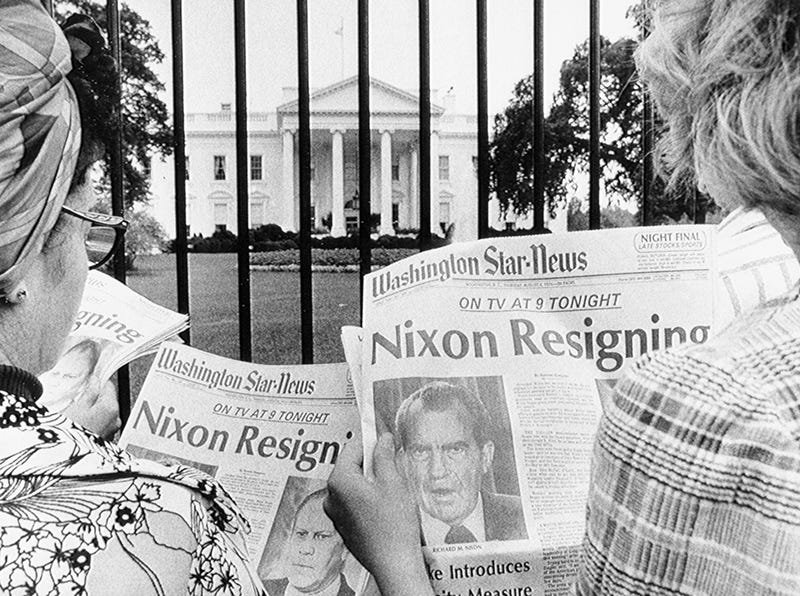Remember, always give your best. Never get discouraged. Never be petty. Always remember, others may hate you, but those who hate you don't win unless you hate them, and then you destroy yourself.”
―Richard Nixon
It’s been 50 years since Richard Nixon resigned.
He was the only President to ever do so in our country’s history. Let’s turn back time and be reminded what viewers of the three major broadcast networks watched on the evening of August 8th, 1974:
Since that historical speech, the national opinion (still posited by a great many Democrats and Republicans) is that Nixon was corrupt, a crook, and the mastermind behind the Watergate scandal. And what’s worse? The narrative allowed continual hero worship for the “dogged journalists” who were simply chasing leads and happened to stumble upon evidence that changed the course of history through dedication and allegiance to exposing the truth.
But what if almost all of it was a lie? What if he made some mistakes but was the unfortunate victim of an ousting? What if he was a victim of lawfare?
What if what you’ve been told about WATERGATE has always been a carefully crafted tale - a ridiculously deceptive and successful story that completely ruined one man’s reputation while providing the real crooks a cover?
The work of Geoff Shepard heavily influenced the following information and research that I did. As you’ll learn below, Shephard played an interesting role in the Nixon administration. After Shepard graduated from Harvard Law School (he went to high school down the road from our old home in California!) Shepard was selected as a 1969–1970 White House Fellow, one of fifteen young Americans chosen to spend that year serving in the Executive Branch. He worked at the Treasury Department as a Special Assistant to the Secretary. In September 1970, Shepard was hired by John Ehrlichman (you’ll learn more about him below) as Assistant to the President for Domestic Affairs for his Domestic Council staff. That staff, the counterpart to the National Security Council staff under Henry Kissinger, worked with the President on domestic issues of national importance. Shepard's immediate superior was Egil Krogh, who later became notorious as the head of the White House Plumbers. Shepard succeeded Krogh as Associate Director for General Government in 1972 and was re-appointed to that position by President Gerald R. Ford in 1974. He left the White House staff in 1975, having authored hundreds of policy memoranda for Presidents Nixon and Ford and their senior staff.
His books (which can be found HERE and HERE) were instrumental in my understanding of the corruption that eventually brought down a former President and set a precedent for lawfare against a political figure. When I outline the key players in the scandal, I’ll often reference the findings that Shepard uncovered and his take on each person’s involvement. It can be assumed that I agree with his findings and conclusions. I’m very grateful for his work and years of research.
Super simplified….
In essence, he (Geoff Shepard) argues that once the scandal investigations had become highly politicized, through the creation of the Senate Watergate Committee and the Office of the Special Prosecutor, two major injustices followed:
First, the scandal itself was skillfully exploited by President Nixon’s political opponents, who were far more interested in destroying the Republican party in advance of the 1976 presidential election than in punishing actual wrongdoing. They hated Nixon for a variety of reasons: he didn’t fit into their elite East Coast club with no Ivy League education, he wasn’t anti-war, and he was anti-communist (he worked overtime to expose Alger Hiss, who was a communist in the State Department). What needs to be made very clear is that the media at the time (CBS, ABC, NBC, NYT, and the WaPo) all worked together to take down a wildly popular president.
Secondly, it was the career prosecutors who had broken the cover-up, but they were quickly removed from the case by Archibald Cox, the newly appointed Special Prosecutor. His office then postponed the pending indictments for ten months while they launched unrelated investigations into every aspect of the Nixon presidency, sent FBI and IRS agents to interview over 120 major Republican contributors, and developed background information on every potential GOP presidential candidate, including President Gerald Ford, Vice President Nelson Rockefeller, Vice Presidential nominee Senator Robert Dole, and California Governor Ronald Reagan. Source.
Let’s get into it…
Watergate, often portrayed as a quintessential example of presidential misconduct, has been etched into the American consciousness as a story of justice prevailing over corruption. However, the narrative surrounding Watergate is far more complex and troubling. Rather than merely a tragedy of a president caught in a web of illegal activities, truth-tellers and investigators are beginning to expose that Watergate was a meticulously orchestrated conspiracy aimed at undermining and ultimately ousting Richard Nixon from office. This perspective asserts that powerful elements within the political establishment, intelligence agencies, and media were complicit in a covert campaign to discredit and remove a president who, despite his flaws, posed a threat to their interests. The Watergate scandal, therefore, is seen not just as a moment of accountability but as a calculated power play that forever altered the course of American politics. This can’t be dismissed as a “difference in opinion” or “conspiracy theory,” no. The paper trail and research lead to one conclusion…
Keep reading with a 7-day free trial
Subscribe to Here are the Headlines to keep reading this post and get 7 days of free access to the full post archives.





